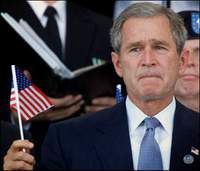Bush refuses to swallow Chavez's bait
U.S. President George W. Bush refuses to be goaded into a war of words with Venezuela's Hugo Chavez, who is answering the president's five-country trek through Latin America with taunts of "Gringo go home."

Bush is trying to spread a message of U.S. compassion for the region and ignore Chavez, who blames U.S.-style capitalism for poverty and inequality in Latin America.
The second stop of Bush's trip is in Uruguay on Saturday, where he will meet with leftist President Tabare Vazquez.
Asked at a news conference Friday in Brazil whether his trip counters Chavez's influence or stokes the populist leader's support, Bush refrained from even naming his nemesis.
"I bring the goodwill of the United States to South America and Central America. That's why I'm here," said Bush, who also is visiting Colombia, Guatemala and Mexico, the AP said.
"I don't think America gets enough credit for trying to help improve people's lives. And so my trip is to explain, as clearly as I can, that our nation is generous and compassionate."
The president and his advisers regularly deflect and downplay Chavez's verbal attacks on Bush, whom Chavez has dubbed the "little gentleman from the North."
Calling Chavez the "Bolivarian gentleman," Thomas Shannon, assistant secretary of state for Western Hemispheric Affairs, said he has made it clear that he does not see the value of any engagement with the United States. Returning from a trip last month to Brazil and Argentina, undersecretary of state Nicholas Burns said, "We don't obsess about Hugo Chavez."
White House press secretary Tony Snow said that while it is tough to ignore Chavez's verbal attacks, the president is going to concentrate on his meetings with heads of state.
"I know you want to make this trip about Chavez," Snow told reporters aboard Air Force One as it flew to Uruguay. "It's not."
He started to say something else, but decided it was best to stay mum. "I almost rose to the bait," he said.
On Friday night, Chavez led a rally at a soccer stadium in Buenos Aires.
"Oh, ho ho! Gringo go home!" Chavez chanted on Argentine state television before leading what was dubbed as an "anti-imperialist" rally with leftist labor, student and social groups. Chavez argued that Bush's goodwill tour would not burnish America's image.
"I believe the chief objective of the Bush trip is to try to scrub clean the face of the empire in Latin America. But it's too late," Chavez said.
The rally was held just across the Rio de la Plata from where Bush is meeting with Vazquez.
Trade will dominate those talks at Estancia Anchorena, a presidential retreat about 155 miles from the capital city. Vazquez, a practicing oncologist, visited the White House in May 2006.
Uruguay, overshadowed by its larger neighbors, Argentina and Brazil, wants to sell more beef and textiles to the United States, its biggest trade partner for two of the past three years.
The United States recently signed a Trade and Investment Framework Agreement with Uruguay, which could lay the groundwork for a Free Trade Agreement. But that could be a tricky move for Uruguay, which is part of Mercosur, the South American trade bloc that frowns on bilateral side deals outside the regional trade group, the AP says.
Many leftists in Uruguay oppose Bush's visit. Some in the region still blame Washington for tolerating brutal military regimes like the Argentine dictatorship of 1976-83, when thousands of dissidents disappeared.
They remain wary of what they see as imperialistic tendencies in other parts of the world, such as Iraq. About 80 people marched Friday under a banner reading, "Genocidal Killer, Out of Latin America!" at the site of the Bush-Vazquez meeting.
It was dark when Bush arrived in Montevideo Friday night, yet thousands of people turned out to see his motorcade. It was impossible to miss. His black limousine and more than 50 other support and law enforcement vehicles, sirens blaring, made the 30-minute drive along the coastline and into the city.
A few people gave a thumb's down sign, but the crowds were mostly subdued. People seemed to have ventured out into the streets and onto the balconies of high-rise apartments to watch Bush's entourage, not make political statements for or against U.S. policies.
Subscribe to Pravda.Ru Telegram channel, Facebook, RSS!


